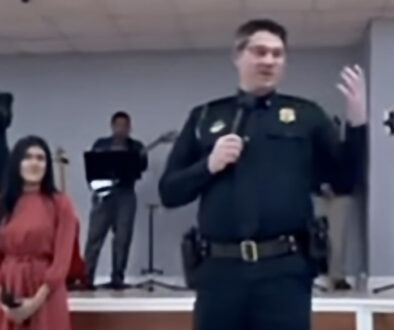Feeding the hungry, one box at a time
By VICTORIA JOHNSON
SILER CITY — A crate of boxes sits under the mid-morning sun on the edge of First Missionary Baptist Church’s parking lot. Each box weighs about 33 pounds and contains $50 worth of food, including vegetables, milk and chicken. This particular week, there’s even a half gallon of strawberry yogurt.
“It’s mostly fresh food,” said Mary Harris, a volunteer from Holy Trinity United Holy Church. She helped distribute these boxes the week before Christmas. “We’re not getting canned stuff … It’s really good staple items that people can serve any way they want to. It’s pretty healthy stuff.”
Nearly every week since April, volunteers primarily from Holy Trinity, First Missionary Baptist Church and Moon’s Chapel Baptist Church have been distributing food boxes to other churches, organizations and people in Chatham County and beyond.
It was all part of the U.S. Department of Agriculture’s Farmers to Families Food Box program, a federal program initiated in April to feed families and provide a market for struggling food producers. The program went through four rounds and is set to end on Dec. 31. Baptists on Mission — an auxiliary organization of the Baptist State Convention of North Carolina in Cary — was one among many others across the country to receive USDA funds to participate in the program.
Baptists on Mission asked Moon’s Chapel to get involved in local distribution in May, Patrick Fuller, the pastor of Moon’s Chapel, told the News & Record. He was among many volunteers unloading and distributing boxes Dec. 18.
“Baptists on Mission is the agency that the U.S. Department of Agriculture is sending them through, so all of these boxes come through the U.S. Department of Agriculture as part of the pandemic recovery plan,” he said. “And we get so many boxes and our three churches, First Missionary, Holy Trinity and Moon’s Chapel, are responsible for distributing them across the county.”
That’s what they did nearly every Friday for the past few months. Starting around 8 or 8:30 a.m., volunteers unloaded more than 1,200 food boxes from a refrigerated truck. The boxes primarily came from Florida.
“Every bit of it gets distributed — every box, every time,” said Melinda Walden, First Missionary Baptist’s secretary. “Usually if the truck is here, and everybody’s in place, we’ve got it all done in two hours.”
Cars, trucks and vans often began lining up around 7:30 a.m. Some represented churches and organizations; others represented families in need. The line wrapped around the church building and extended all the way to a nearby school. After unloading the truck, volunteers divided up the boxes and started two lines.
Individuals picking up 12 or fewer boxes lined up closer to the church, while churches and organizations picking up in bulk — 13 boxes or more — lined up in the back of the parking lot, closer to the empty truck.
“Some people come in their cars, then they get 15 or 20 boxes in their cars, and that’s kind of amazing,” Harris said. Wrapped up in a black coat, she manned the line distributing boxes to individuals. “They put them wherever they can find a hole to put them.”
Each church or organization received a set amount of boxes determined by the size of the congregations or communities they serve.
“When you think about serving people, you want to serve as many people as you can, so when you start thinking about large churches, you want more boxes,” Harris said. “Less people, less boxes.”
Holy Trinity, for instance, received about 115 boxes to distribute among its own congregation.
“Because if we didn’t do it that way, we would always run out,” said Rev. Barry Gray, who’s been First Missionary Baptist’s pastor for about 22 years. Wrapped up in a black “NYC” winter hat and a blue surgical mask, he helped distribute boxes on Dec. 18. “A church from Wake Forest comes way down here. They are to get 50 boxes, and you know, it’d be a shame for them to drive all the way down here and then we don’t have nothing but 10 left.”
Most of the boxes go to churches and organizations, but he said any individual family can pick up on a first-come, first-serve basis.
“People can come from anywhere and say, ‘Look, I want two boxes. I want four boxes,’ and they just throw them in the car and let them keep on,” he said. “So people say, ‘I’m getting me one. I got a couple of neighbors here, relatives.’ And so that’s how the distribution really goes.”
Sometimes, they ran out before they could serve every car; other times, churches or organizations never arrived to pick up their share.
“So that means we got 25 to 50 extra boxes to give out,” he said. “So it don’t take long for them to get gone, either; it’s food. And really, that’s the key thing — we have been positioned to really be a blessing to a lot of people, and that’s all it is. … The only thing we do is provide the place, time and some of the manpower, and we get it done.”
‘We just went up and up’
It all started with a simple online application and a drive to help a hurting community.
An associate minister of First Baptist Missionary, Rev. Donald Matthews, had been searching for resources online. He found out the Baptist Convention of North Carolina had a plan to distribute fresh food during the shutdown and was accepting applications from churches and organizations across the state. Matthews submitted an application in April. Soon after it was approved.
Every Thursday, volunteers drove up to Cary around 10 a.m., loaded up vans with food boxes and then drove back to Siler City, where they distributed it all out.
“We started out with about 50 boxes, and then we just went up and up. They said, ‘Hey, if you need more, you can get more,’” Gray told the News & Record, adding with a laugh, “‘We need more,’ so, you know, it got up to probably about 160 boxes that we were bringing here.”
In October, Baptists on Mission asked First Baptist Missionary to become a food distribution hub for churches and organizations across Central North Carolina. Instead of going to Cary, Walden said a refrigerated truck with 1,248 boxes of food now went to them in “little bitty Siler City.”
Besides individuals, they distributed food to over 30 churches and organizations, including West Chatham Food Pantry and Communities In Schools. It wasn’t just Chatham County either; food boxes distributed in First Missionary Baptist’s parking lot reached surrounding counties, too. Another refrigerated truck took some boxes to Archdale.
“We have a group from Wake Forest that picks up, and they distribute up as far as Henderson and Lewisburg,” Walden said. “They’ll even go up that far with theirs … And we have a guy that picks up out into Alamance County.”
One week in late November, they even distributed three trucks’ worth of food — about 3,744 boxes.
“It was real crazy,” Walden said, “but we were able to cover Harnett County, Lee County, Randolph County, Chatham County, Alamance County, Guilford County, Rockingham County.”
It’s been a wild success, Gray added.
“When we first started, the first two times we did this, man, we had a time trying to get rid of these boxes, driving and knocking on people’s doors, ‘Man, here’s some food,’” Gray said. “But ever since then, they come. These boxes will not last, you know?”
He gave all the glory to God, of course, but he found it gratifying to help out his community.
“This is my home,” he said, “… and it makes you feel good as a pastor, as a, you know, homeboy, to be able to help people that you’ve known all your life.”
Week to week, he said they never know who’s going to show up to volunteer — and that’s been the beauty of it. The other day, he came across someone in the grocery store who told him he’d be volunteering that week instead of lining up.
“He said, ‘I think if we’re going to receive something, we have to be willing to give something.’ And that’s a good way to look at this thing,” Gray said. “He said, ‘I don’t want to just, you know, come over and pick up boxes … but I want to be there to help do what I can.’”
Perhaps the most beautiful part of it all for Gray has been seeing the community come together.
“It’s just not Black churches. It’s all churches,” he said, adding, “It’s about just seeing people work hand in hand. You see white, Black. You see people from all different walks of life coming. We’re all in this thing together.”
The last distribution was Dec. 18. The program funding the food boxes ends on Dec. 31, and no one yet knows when or how the program will continue.
“As far as we know, that was the last day, but we’re waiting for word from Washington if there will be another round, so Baptists on Mission will let us know if there’s another round,” Fuller told the News & Record. “… We’re hoping that it’s in (the new relief bill), but we don’t know.”
Rep. Mark Walker told him a few “things (are) in the works,” Fuller added, but no one yet knows what that will entail.
“There’s no telling what we’ll be doing in the future,” Gray said, “but we’re gonna do it as long as they send it.”


